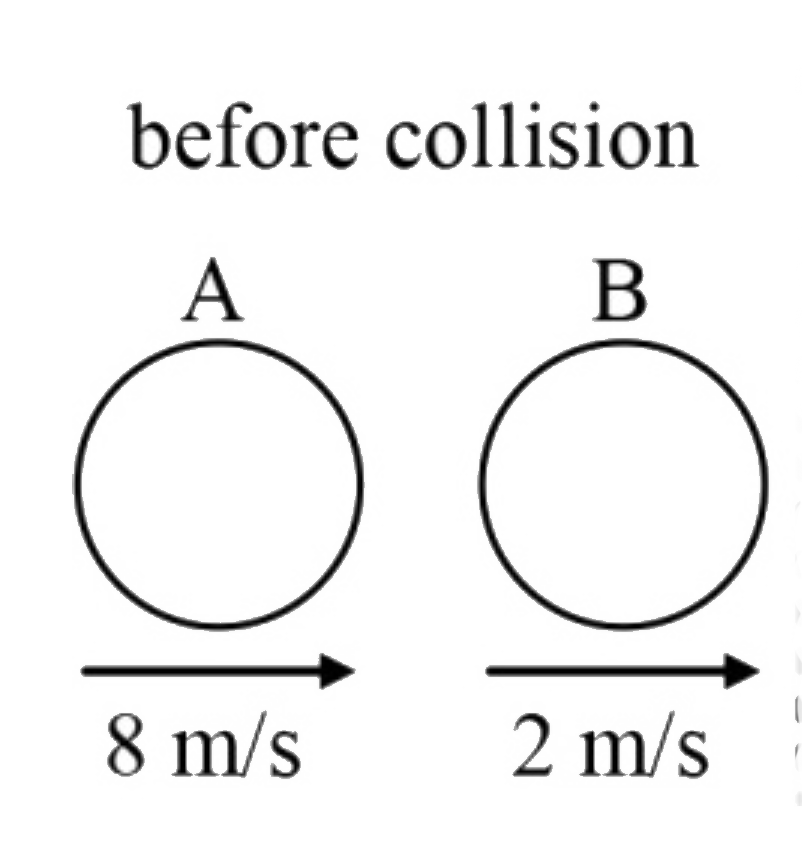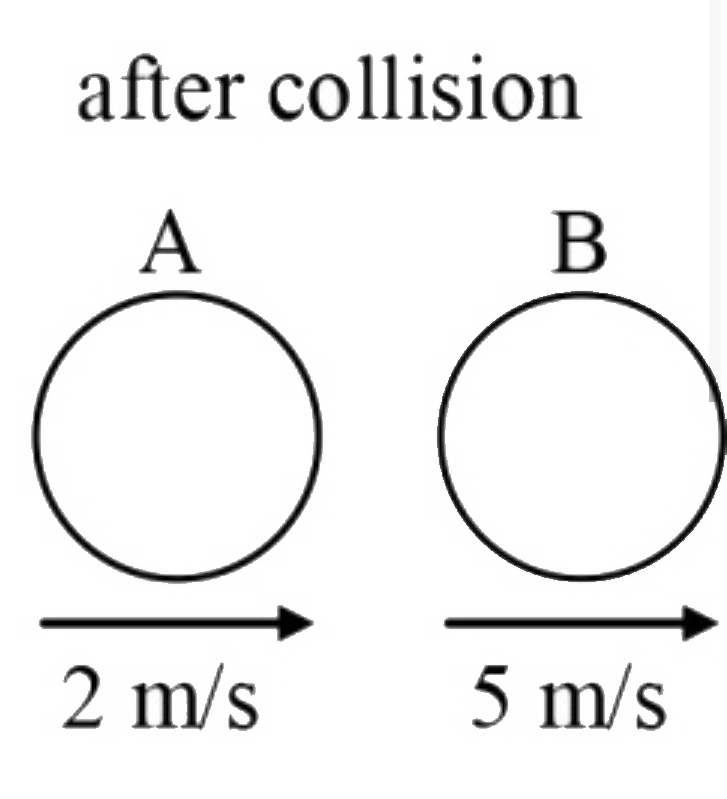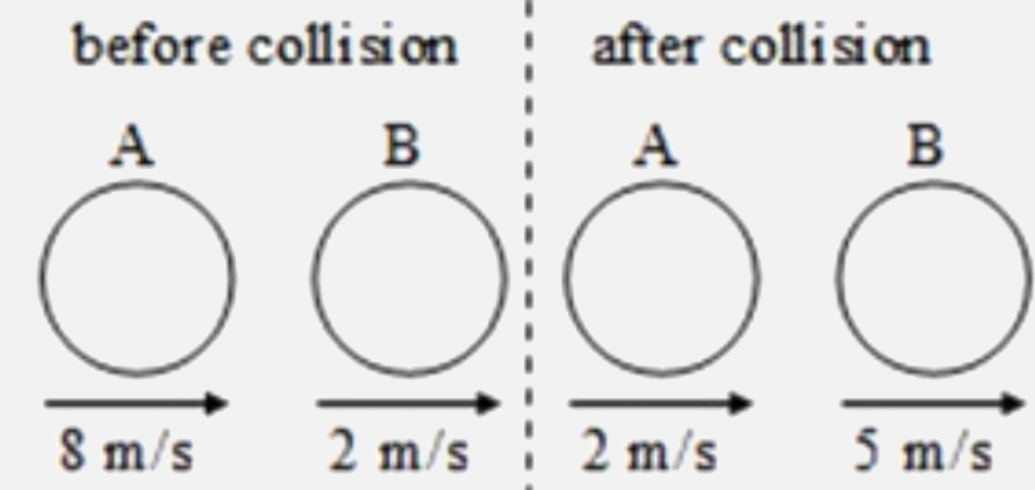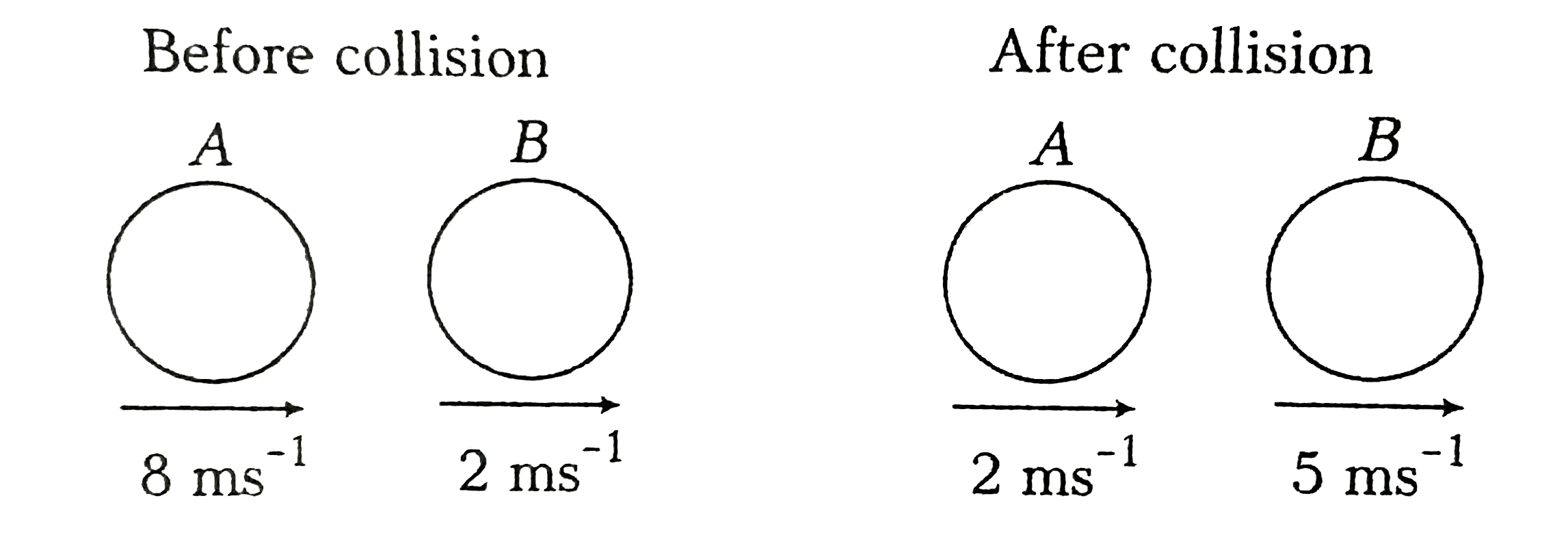In an elastic collision between spheres A and B of equal mass but unequal radii, A moves along the x-axis and B is stationary before impact. Which of the following is possible after impact ?
A comes to rest
The velocity of B relative to A remains the same in magnitude but reverses in direction
A and B move with equal speeds, making an angle of each with the x-axis
A and B move with unequal speeds, making angles of and with the x-axis respectively.
The correct Answer is:A, B, C, D
Step by step video, text & image solution for In an elastic collision between spheres A and B of equal mass but unequal radii, A moves along the x-axis and B is stationary before impact. Which of the following is possible after impact ? by Physics experts to help you in doubts & scoring excellent marks in Class 11 exams.
Updated on:21/07/2023Topper's Solved these Questions
- LINEAR MOMENTUM & ITS CONSERVATIONBOOK - PHYSICS GALAXY - ASHISH ARORACHAPTER - LINEAR MOMENTUM & ITS CONSERVATIONEXERCISE - unsolved
110 Videos
- LINEAR MOMENTUM & ITS CONSERVATIONBOOK - PHYSICS GALAXY - ASHISH ARORACHAPTER - LINEAR MOMENTUM & ITS CONSERVATIONEXERCISE - exercise 1.3
3 Videos
- LINEAR MOMENTUM & ITS CONSERVATIONBOOK - PHYSICS GALAXY - ASHISH ARORACHAPTER - LINEAR MOMENTUM & ITS CONSERVATIONEXERCISE - Numerical MCQ s
75 Videos
- KINEMATICSBOOK - PHYSICS GALAXY - ASHISH ARORACHAPTER - KINEMATICSEXERCISE - Unsolved Numerical Pro.
83 Videos
- NEWTONS LAWS OF MOTIONBOOK - PHYSICS GALAXY - ASHISH ARORACHAPTER - NEWTONS LAWS OF MOTIONEXERCISE - Unsolved Numerical Problem
81 Videos
Similar Questions
The two diagrams show the situation before and after a collision between two spheres A and B of equal radii moving along the same straight line on a smooth horizontal surface. The coefficient of restitution e is


View SolutionThe two diagrams show the situation before and after a collision between two spheres A and B of equal radii moving along the same straight line on a smooth horizontal surface. The coefficient of restitution e is

View Solution
Knowledge Check
In an elastic collision between disks A and B of equal mass but unequal radii, A moves along the x-axis and B is stationary before impact. Which of the following is possible after impact?
AA comes to restBThe velocity of B relative to A remains the same in magnitude but reverses in directionCA and B move with equal speeds, making an angle of 45∘ each with the x-axisDA and B move with unequal speeds, making angles of 30∘and60∘ with the x-axis respectivelyIn elastic collision between spheres P and Q of equal mass but unequal radii , move along a straight line. Which of the following may be correct after the collisions ? (i) P comes to rest and Q moves with velocity of P.
(ii) P and Q move with equal speeds making an angle of 45∘ each with original line of motion.
(iii) P and Q move with unequal speeds , making angles of 30∘ and 60∘ with the original line of motion , respectively.
(iv) P comes to rest:A(i) onlyB(iv) onlyC(iii) onlyDNoneConsider the elastic collision f two bodies A and B of equal mass. Initially B is at rest and A moves with velocity v. After the collision -
Athe body A tracks, its path back with the same speedBthe body A comes to rest and B moves aways in the direction of A' is approach with the velocity vCboth the bodies stick together and are restDB moves with velocity v/2 and A retraces its path with velocity v/2
The two diagrams show the situations befoer and after a collision between two spheres A and B of equal radii moving along the same straight line on a smooth horizontal surface. The coefficient of restitution e is lt brgt

View SolutionAfter an head on elastic collision between two balls of equal masses, one is observed to have a speed of 3m/s along the positive x-axis and the other has a speed of 2m/s along the negative x-axis. What are the original velocities of the balls?
View SolutionIn head - on collision between two particles A and B of same mass , A is moving with momentum 15kgm/s , B is stationary . During the impact , B gives impulse 10N−s to A . The coefficient of restitution is
View SolutionIn a head on collision between tow identical particles A and B moving on a horizontal surface, B is stationary and A has momentium P0 before impact. Due to the impact, A recieives an inpulse I. Then coefficient of restitution between the two is :
View SolutionIn a one dimensional collision between two identical particles A and B, B is stationary and A has momentum p before impact. During impact, B given J to A.
View Solution
